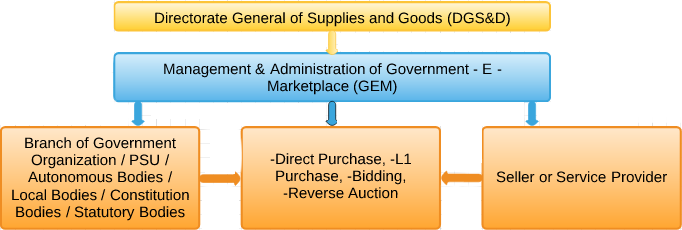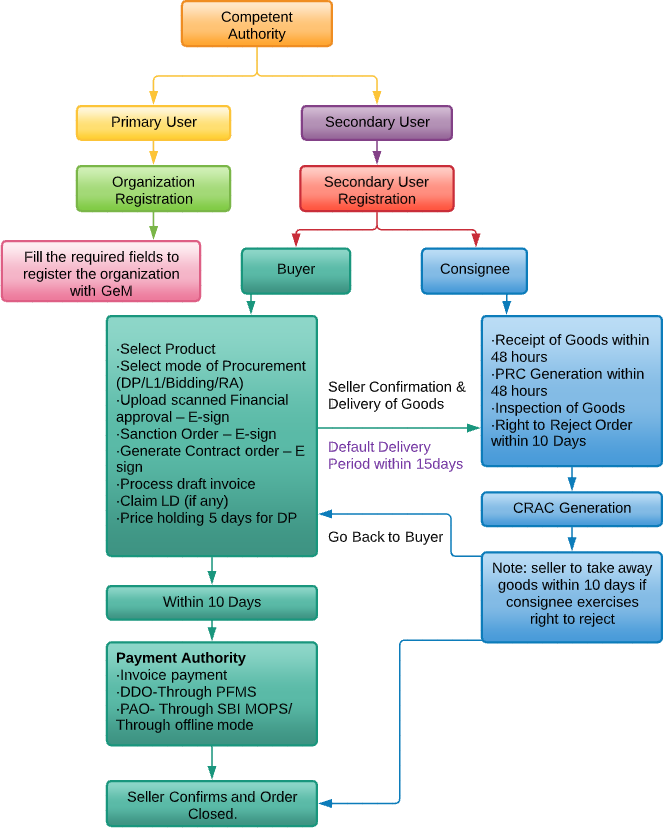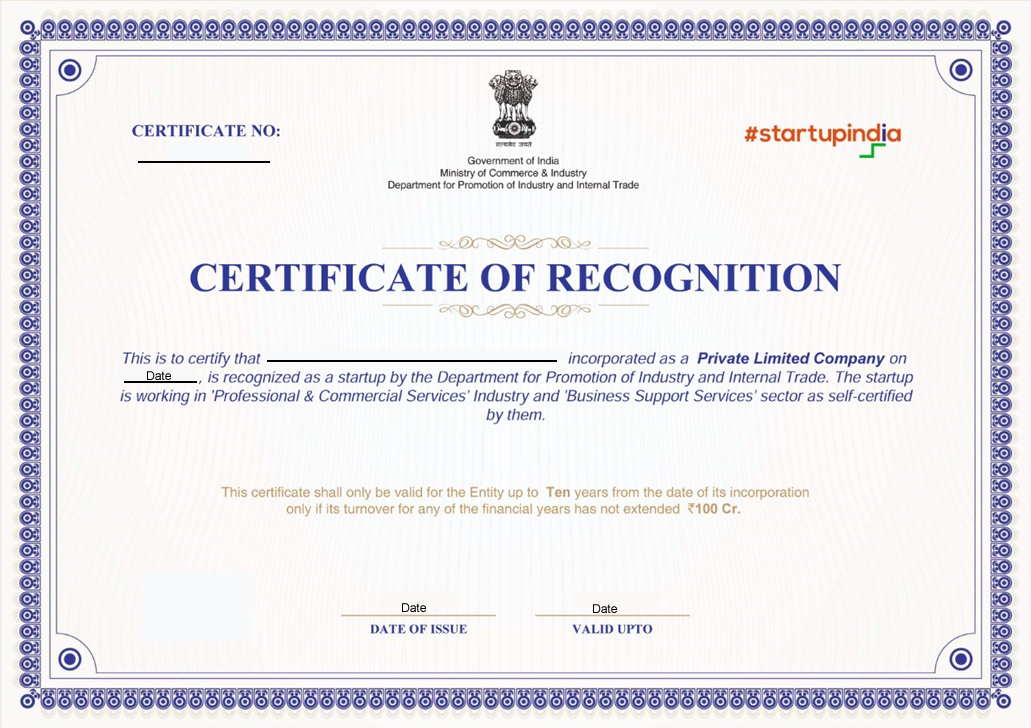Introduction of Startup India Scheme
The Startup India Scheme is an initiative of the Government of India in 2016. The primary objective of Startup India is the promotion of startups, generation of employment, and wealth creation. The keyword is innovation. The business either develops a new product/ service or redevelops a current product/service into something better. The Startup India has initiated several programs for building a robust startup ecosystem and transforming India into a country of job creators instead of job seekers. These programs are managed by the Department for Industrial Policy and Promotion (DPIIT).
In order to carry on a sustainable economic growth and generate large scale employment opportunities in the nation, the Government through this initiative aims to empower startups and make them grow through innovation and design. The Action Plan comprises of 19 action items spanning across areas such as “Simplification and handholding”, “Funding support and incentives” and “Industry-academia partnership and incubation”. The Startup India scheme has a 19-Point Startup India Action Plan that includes several services like various incubation centres, easier patent filing, tax exemptions, ease of setting-up of business, a massive 10,000 crore corpus fund, and a faster exit mechanism, among various other advantages
The Department for Promotion of Industry and Internal Trade (DPIIT) is mandated to coordinate implementation of Startup India initiative with other Government Departments. Apart from DPIIT, the initiatives under Startup India are driven primarily by five Government Departments viz. Department of Science and Technology (DST), Department of Bio-technology (DBT), Ministry of Human Resource Development (MHRD), Ministry of Labour and Employment and Ministry of Corporate Affairs (MCA) and NITI Aayog.
Organized by the Department for promotion of industry and internal trade, the major objective of Startup India is to discard some of the restrictive States Government policies which include:
- License Raj
- Land Permissions
- Foreign Investment Proposals
- Environmental Clearances
The Startup India scheme is based majorly on three pillars which are mentioned below:
- Providing funding support and incentives to the various start-ups of the country.
- To provide Industry-Academia Partnership and Incubation.
- Simplification and Handholding.
The Startup India scheme has a 19-Point Startup India Action Plan that includes several services like various incubation centers, easier patent filing, tax exemptions, ease of setting-up of business, a massive 10,000 crore corpus fund, and a faster exit mechanism, among various other advantages.
The government has initiated services like Simple process to get a registered name, low cost of formalities, easy access to a fund out of 10,000 crore corpus, no income tax for first 3 years, no prior experience required to have government tenders, various R&D facilities, No time-consuming compliances, Tax saving options for investors, choose your investor or VCs, easy exit and so on.
As far as patent costs are concerned, the startups can claim an 80% rebate under the scheme. If a startup applies for a patent, the government will fund the defense of the patent, and give rebate of 80% in the total fees.
Also there would be no inspection carried out on start-ups for first three years regarding labor laws. However, environment law compliance is required only post-self certification by the government.
Government has also proposed to hold 2 startup fests in a year both nationally and internationally, in order to enable the various stakeholders of a startup to meet each other. This helps in creating huge networking opportunities.
Startup India Scheme is all about the establishment of small or new businesses. It is usually used for a small company started by one or a group of individuals. A startup offers a new product/service that is not being given by any other organization in a similar fashion. Basically, startup is known for its presence in the innovation space. A startup either develops a new product/ service or recreates a current product/service and offers something better.
Under the Startup India initiative, eligible companies can get recognized as Startups by DPIIT (Department For Promotion Of Industry And Internal Trade), in order to access a host of tax benefits, easier compliance, IPR fast-tracking & more.
Recognition as Start-up under Department for Promotion of Industry and Internal Trade

Company Age
Period of existence and operations should not be exceeding 10 years from the date of Incorporation

Company Type
Incorporated as a Private Limited Company, a Registered Partnership Firm or a Limited Liability Partnership

Annual Turnover
Should have an annual turnover not exceeding 100 crore for any of the financial years since its Incorporation

Original Entity
Entity should not have been formed by splitting up or reconstructing an already existing business

Innovative & Scalable
Should work towards development or improvement of a product, process or service and/or have scalable business model with high potential for creation of wealth & employment
Benefits from DPIIT

Simplification and Handholding – Easier compliance, easier exit process for failed startups, legal support, fast-tracking of patent applications and a website to reduce information asymmetry.

Funding & Incentives – Exemptions on Income Tax and Capital Gains Tax for eligible startups; a fund of funds to infuse more capital into the startup ecosystem and a credit guarantee scheme.

Incubation & Industry-Academia Partnerships – Creation of numerous incubators and innovation labs, events, competitions and grants.
Startup Funding Options in India
Funding is an extremely significant aspect in line with meeting the vision of a business. Funding and fundraising, both are fundamental modern business scenarios that support the growth of a startup. The first round of funding which is popularly known as seed-funding forms the basis of fundraising. It is followed by series A, B and C rounds of funding. While the seed funding typically refers to the basic, initial round of funding, series A, B, and C differ in the business maturity and the type of investors involved. The series funding helps in the evolvement of a startup to a full-fledged organization by helping it with calculated funds at crucial steps.
Go for Crowd funding
- In this option, more than one investor is involved and they offer a fixed amount of money based on your business idea, goal, plan of action, and plans of making a profit. All you need to have are people who truly believe in your business idea. The concept of crowdfunding is quite similar to mutual funds on a basic level
Consider Self-funding/bootstrapping
- it is an ideal plan of action when it is hard to convince others of your business idea and vision if the initial business requirement is small. Often investors ask for traction before making an investment, the initial round of self-funding allows you to prove the feasibility of your idea and build confidence in the investors for a further round of funding.
Business Incubators & Accelerators Funding
- Business incubators and business accelerators provide advice, guidance and various forms of support for businesses in the startup phase. The key difference between them is that business accelerators, as the name suggests, compress the timescale for starting up by operating as a type of boot camp. Business accelerators claim to help entrepreneurs hit the ground running; business incubators nurture the business in its startup phase, allowing it to develop at its own pace.
Get in touch with the Venture Capitalists
- venture capitalists offer professionally managed funds for those who are looking for startups that have success potential. The best part about venture capital investments is the expertise and monitoring that they bring along. Ordinarily, VCs invest in equity and once the business releases its IPO or is acquired, they leave.
Try Angel Investment
- There are individuals with surplus cash looking for investing in promising startups and earn their share once it grows to its potential. They can either work alone or collectively in a network to screen startups with huge potential. This funding option has business minds looking to earn interest out of your success and they may expect as high as 30% equity as well.
Government Funds
- New-entrants are granted a tax-holiday for three years. The government has provided a fund of 2500 crore for startups, as well as a credit guarantee fund of 500 crore rupees.
Self Certification
The procedure to self-certification is to reduce the regulatory burden on Startups. Also, the Startups could focus on the core business.
Eligibility to Self-Certification of the companies – DPIIT recognized startups that are within 5 years of incorporation. This certificate shall only be valid for the Entity up to Ten years from the date of its incorporation only if its turnover for any of the financial years has not extended ₹100 Crore.
Registration Process :
- The startup has to register their company in the portal belong to the Ministry of Labour and Employment “Shram Suvidha Portal”
- Register at Shram Suvidha Portal and then login.
- After successful login, click link “Is any of your Establishment a Startup?”
- Then the registration can be done by following the instructions
Benefits :
- Startups are allowed to self-certify compliance for 6 Labor Laws and 3 Environmental Laws through a simple online procedure.
Labor Laws :
- The Building and Other Constructions Workers’ (Regulation of Employment & Conditions of Service) Act, 1996
- The Payment of Gratuity Act, 1972
- The Inter-State Migrant Workmen (Regulation of Employment & Conditions of Service) Act, 1979
- The Contract Labor (Regulation and Abolition) Act, 1970
- The Employees’ Provident Funds and Miscellaneous Provisions Act, 1952
- The Employees’ State Insurance Act, 1948
Environment Laws :
- The Water (Prevention & Control of Pollution) Act, 1974
- The Water (Prevention & Control of Pollution) Cess (Amendment) Act, 2003
- the Air (Prevention & Control of Pollution) Act, 1981
- For labor laws, there will be any inspections for a period of 5 years. Startups will be inspected only on receipt of a credible and verifiable complaint of violation in the form of writing to the inspecting officer. Startups can do self assessment for labour law compliances and there will be no inspection or physical visit by public officers during the first 3 years. Startups can self-certify through startup India portal with given below 6 labour laws.
- For environment laws, startups which fall under the ‘white category’ [as defined by the Central Pollution Control Board (CPCB)] would be able to self-certify compliance and only random checks would be carried out in such cases
Self Certification

Tax Exemption under 80IAC
Eligible startups are exempted from paying income tax for 3 consecutive financial years out of their first ten years since incorporation. Startups do not have to pay income tax for the first three years but to avail such benefits; the company must be certified by the Inter-Ministerial Board (IMB). This is where companies registered with DIPP get relaxation as the registration is enough to get the benefits. The Inter-Ministerial Board setup by Department of Industrial Policy and Promotion validates Startups for granting tax related benefits. The Board comprises of the following members:
- Joint Secretary, Department for Promotion of Industry and Internal Trade, Convener
- Representative of Department of Biotechnology, Member
- Representative of Department of Science & Technology, Member
The board shall validate startups for the Income Tax Exemption on profits under Section 80-IAC of Income Tax Act Eligibility to avail tax exemption under 80IAC-
- The entity should be recognized by the DPIIT
- Only Private Limited Companies or Limited Liability Partnerships are eligible for tax exemption under Section 80IAC
- The Startup must have been incorporated on or after 1st April, 2016
Registration Process & Documents
- Access Startup India portal and register
- After registration, apply for DPIIT recognition
- Access the Section 80 IAC exemption application
- Fill in all details with the below-mentioned documents uploaded and submit the application form
Documents Needed
- Memorandum of Association for Pvt. Ltd./LLP Deed
- Board Resolution (If Any)
- Annual Accounts of the startup for the last three financial years
- IT returns for the last three financial years Electronic Process after Applying
- Refer to your Dashboard on the Startup India Portal for the status of your application. This can be found on the top right of the page after you log in.
- For any clarifications, please email: dipp-startups@nic.in
Section 56 Exemption
Exemption under Section 56(2) (VIIB) of Income Tax Act - After startup India registration, you may apply for Angel Tax Exemption u/s 56 of the Income Tax Act 1961:
- Investments into eligible startups by listed companies with a net worth of more than 100 Crore or turnover more than 250 Crore shall be exempt under Section 56(2) VIIB of Income Tax Act
- Investments into eligible Startups by Accredited Investors, Non-Residents, AIFs (Category I), & listed companies with a net worth more than 100 crores or turnover more than 250 Crore, shall be exempted under Section 56(2)(VIIB) of Income Tax Act
- Consideration of shares received by eligible startups shall be exempted upto an aggregate limit of 25 Crore
Eligibility to avail tax exemption under Section 56
- Should be a private limited company
- Should have been recognized as a DPIIT. To get DPIIT recognition, click on “Get Recognized” below.
- Not Investing in specified asset classes
- Startup should not be investing in immovable property, transport vehicles above 10 Lakh, Loans and advances, capital contribution to other entities, except in the ordinary course of business
Registration Process
- Registration to be done at the Startup India Portal
- Get DPIIT Recognition
- File the up Section 56 Exemption application form from this link
- Startup company will receive an email once the registration is activated
Easy Winding up of Company
This is to ease the shut down or wind up operations of the startups. This will allow the entrepreneurs to reallocate capital and resources to more productive avenues faster. To encourage entrepreneurs to experiment with new and innovative ideas without facing complex exit processes where their capital stuck in case of business failure.
As per the Insolvency and Bankruptcy Code, 2016, startups with simple debt structures, it can be wound up in 90 days of filing the application for insolvency.
An insolvency professional can be appointed for the Startup who can be in charge of the company including liquidation of its assets and paying its creditors within six months of such appointment. It is responsibility of the insolvency professional to the closure of the business, sale of assets and repayment of creditors in accordance with the distribution waterfall set out in the IBC.
Reduced cost for Patent Application and IPR Application
The objective is to reduce the cost and time taken for a startup to acquire a patent, making it financially viable for them to protect their innovations and encouraging them to innovate further. Intellectual Property Rights (lPRs) are emerging as a strategic business tool for any business organization to enhance industrial competitiveness. Start-Ups, with limited resources and manpower can sustain in this highly competitive world only through continuous growth and development oriented innovations; for this, it is equally crucial that they protect their IPRs. The scheme for Start-Ups Intellectual Property Protection (SIPP) is envisaged to facilitate protection of Patents, Trademark and Designs of innovative and interested Start Up. The Indian Patent Office (IPO) has issued guidelines for startups to file patent, trademark and design application under Start-Ups Intellectual Property Protection (SIPP).
- Fast-tracking of Startup Patent Applications – The applications will be fast-tracked so that the value can be realized sooner
- Panel of facilitators to assist in the filing of IP applications – The facilitators will be assisting in the filing of applications.
- Government to bear facilitation cost – Under this scheme, the Central Government shall bear the entire fees of the facilitators for any number of patents, trademarks or designs that a Startup may file, and the Startups shall bear the cost of only the statutory fees payable.
- Rebate on the filing of application – Startups shall be provided with an 80% rebate in filing of patents vis-a-vis other companies. This will help them pare costs in the crucial formative years
Features of the Scheme
The following features make the scheme a stand-out factor:
- New-entrants are granted a tax-holiday for three years.
- The government has provided a fund of 2500 crore for startups, as well as a credit guarantee fund of 500 crore rupees.
Eligibility for Startup Registration
- The company to be formed must be a private limited company or a limited liability partnership.
- It should be a new firm or not older than five years, and the total turnover of the company should be not exceeding 100 crores.
- The firms should have obtained the approval from the Department of Industrial Policy and Promotion (DIPP).
- To get approval from DIPP, the firm should be funded by an Incubation fund, Angel Fund or Private Equity Fund.
- The firm should have obtained a patron guarantee from the Indian patent and Trademark Office.
- It must have a recommendation letter by incubation.(which has been recently waived off)
- Capital gain is exempted from income tax under the startup India campaign.
- The firm must provide innovative schemes or products.
- Angel fund, Incubation fund, Accelerators, Private Equity Fund, Angel network and all the details regarding the funding must be registered with SEBI (Securities and Exchange Board of India).
- The firm must come up with innovative ideas and schemes
Other incentives for Start-up-
10,000 crore funds for investment into startups through Alternate Investment Funds and 2,000 crore credit Guarantee fund for Startups through National Credit Guarantee Trust Company/ SIDBI.
Cloud Services-
- $ 1000 worth Cloud Credits @ Amazon Web Services,
- $ 1000 worth Cloud Credits @ DigitalOcean,
- $ 300 worth Cloud Telephony Services @ MyOperator,
- $ 100 worth Cloud Telephony Services @ Exotel
Funding Opportunities & Other Government Schemes - Startups registered under Startup India scheme can avail funding under various government or semi government aided schemes such as
- Venture Capital Assistance Scheme - Under this scheme, interest free loan is provided by Small Farmers’ Agribusiness Consortium (SFAC) to projects falling short of capital requirement for project completion.
- Support to MSMEs for International Patent Protection in Electronics and IT - Stand Up India Scheme bank loan from ₹10 lakh-₹1 crore to at least 1 SC/ST borrower and at least one women enterprise per bank branch.
- Single Point Registration Scheme (SPRS) - NSIC registers MSEs under SPRS scheme for participation in Government Purchases.
Easier Public Procurement Norms
Get listed as seller to the government in India’s Largest E-procurement portal, Government - E - Marketplace (GEM) & benefit from exemptions on Earnest Money Deposit (EMD) in all Central Government Ministries/ Departments & minimum requirements. There is relaxation under the criteria of Prior Turnover / Prior Experience in Government Tenders.
In order to remove corruption, the public procurement is being transformed as online market places and e-tendering by the Government of India. The Government e-Marketplace (GeM) also offers other advantages such as minimizing prices while maximizing ease, efficiency and transparency. It will enhance demand aggregation, real time price discovery and prompt automated payments. Hence GeM is an end to end, Government-e-Market Place hosted by Directorate General of Supplies and Goods (DGS&D) where common user goods and services can be procured by various government organizations.
GeM promotes entrepreneurship and empowerment by making it possible to start doing business with government through a completely online and faceless system. Objective of GeM is to promote the concept of minimum price with maximum ease, efficiency and transparency.
How does Government-e-Market Place work?


Features of Government - E - Marketplace (GEM)

Easier Norms on GeM Portal
Government e-Marketplace [GeM] is an e-commerce portal for public procurement where private sellers including startups can sell products and services to government buyers and participate in government e-tenders. Get registered as a seller on government e-Marketplace aka GeM portal A registered startup can enjoy privileges over others private sellers. Separate scheme launched for startup named GeM Startup Runway Scheme.
On Gem Startup Runway scheme, Startups are entitled to avail exemption on:
- Prior Turnover
- Prior Experience
- Earnest Money Deposit
- Minimum criteria for govt. tender
Work flow and time lines of Government - E - Marketplace (GEM)

Start-up Company DPIIT Recognition Process
A person should incorporate their business first either as a Private Limited Company or as a Limited Liability Partnership or as a Partnership Firm along with obtaining the certificate of Incorporation, PAN, and other required compliances.
A person needs to log in to the official website of Startup India where he/she has to fill all the essential details of the business in the registration form and upload the required documents.Log on Startup India Portal https://startupindia.gov.in/registration.php and Enter details of your Incorporation/Registration No., PAN Number (optional), the Authorized Representative,your address, Pin Code & State,Details of Directors and Partners, Upload the essential documents and Self-certification in the prescribed manner and File the Incorporation/Registration certificate of the company.
A letter of recommendation, Incorporation/Registration Certificate, and a brief description of the business are some of the essential documents required for the registration purpose.
After successful registration and verification of the documents, you will be immediately provided with a recognition number for your startup along with a certificate of recognition
Since the start-ups are exempted from income tax benefits, therefore, they must be recognized by the Department of Industrial Policy and Promotion (DIPP) before availing these benefits. Also, they should be certified by the Inter-Ministerial Board (IMB) to be eligible for Intellectual Property Rights (IPR) related benefits.
Since the start-ups are exempted from income tax benefits, therefore, they must be recognized by the Department of Industrial Policy and Promotion (DIPP) before availing these benefits. Also, they should be certified by the Inter-Ministerial Board (IMB) to be eligible for Intellectual Property Rights (IPR) related benefits.
After successful registration and verification of the documents, you will be immediately provided with a recognition number for your startup along with a certificate of recognition
Steps to Register Your Startup with Startup India
Incorporate your Business
- You must first incorporate your business as a Private Limited Companyor a Partnership firm or a Limited Liability Partnership. You have to follow all the normal procedures for registration of any business like obtaining the Certificate of Incorporation/Partnership registration, PAN, and other required compliances.
Register with Startup India
- log on to the Startup India website and fill-up the form with details of your business. Next, enter the OTP which is sent to your e-mail and other details like, startup as the type of user, name and stage of the startup, etc. After entering these details, the Startup India profile is created.
- Once, your profile is created on the website, startups can apply for various acceleration, incubator/mentorship programmes and other challenges on the website along with getting access to resources like Learning and Development Program, Government Schemes, State Polices for Startups and pro-bono services
Get DPIIT Recognition
- after creating the profile on the Startup India Website is to avail Department for Promotion of Industry and Internal Trade (DPIIT) Recognition. This recognition helps the startups to avail benefits like access to high-quality intellectual property services and resources, relaxation in public procurement norms, self-certification under labour and environment laws, easy winding of company, access to Fund of Funds, tax exemption for 3 consecutive years and tax exemption on investment above fair market value.
- For getting DPIIT Recognition, click on the ‘Get Recognised’ button if you are a new user. If you are an existing user click on the ‘Dashboard button’ and then ‘DPIIT Recognition’.
Recognition Application
- Once applied for the startup India registration, you will receive an acknowledgment receipt number (ARN) for tracking your certificate status.The ‘Recognition Application Detail’ page opens. On this page click on ‘View Details’ under the Registration Details section. Fill up the ‘Startup Recognition Form’ and click on ‘Submit’.
Documents for Registration
- Incorporation/Registration Certificate of your startup
- Proof of concept like pitch deck/website link/video (in case of a validation/ early traction/scaling stage startup)
- Patent and trademark details (Optional)
- Details of the Directors
- PAN Number
Recognition Number
- On applying you will immediately get a recognition number for your startup. The certificate of recognition will be issued after the examination of all your documents which is usually done in 2 days after submitting the details online.
- However, be careful while uploading the documents. If on subsequent verification, it is found to be obtained that the required document is not uploaded/wrong document uploaded or a forged document has been uploaded then you shall be liable to a fine of 50% of your paid-up capital of the startup with a minimum fine of 25,000.
Other Areas
- Patents, trademarks and/or design registration: If you need a patent for your innovation or a trademark for your business, you can easily approach any from the list of facilitators issued by the government. You will need to bear only the statutory fees thus getting an 80% reduction in fees.
- Funding: One of the key challenges faced by many startups has been accessing finance. Due to lack of experience, security or existing cash flows, entrepreneurs fail to attract investors. Besides, the high-risk nature of startups, as a significant percentage fail to take off, puts off many investors.
- In order to provide funding support, the Government has set up a fund with an initial corpus of 2,500 crore and a total corpus of 10,000 crore over a period of 4 years (i.e. 2,500 crore per year). The Fund is in the nature of Fund of Funds, which means that it will not invest directly into Startups, but shall participate in the capital of SEBI registered Venture Funds.
- Self Certification Under Employment and Labour Laws: Startups can self certify under labour laws and environment laws so that their compliance costs are reduced. Self-certification is provided to reduce regulatory burden thereby allowing them to focus on their core business. Startups are allowed to self-certify their compliances under six labour laws and three environment laws for a period of 3 to 5 years from the date of incorporation.
Units operating under 36 white category industries as published on the website of the Central Pollution Control Board do not require clearance under 3 environment-related Acts for 3 years. - Tax Exemption: Startups are exempted from income tax for 3 years. But to avail these benefits, they must be certified by the Inter-Ministerial Board (IMB). The Startups incorporated on or after 1st April 2016 can apply for the income tax exemption.
After the examination of all your documents viz. Company incorporation certificate & Pan Card, Company website or Brochure and GST number (For invoice) the Certificate of Recognition is issued which is usually done in 2 days after submitting the details online. Here is a sample of “Certificate of Recognition” to avail tax exemptions and other benefits:

Documents Which Have Been Waived Off
Startup India has changed the procedure of registration since its inception. It has exempted most of the previous requirements now. Many documents which were required to be filed previously are waived off. The list of documents that are not required to be filed at the time of the registration are-
- Letter of Recommendations
- Letter of funding
- Sanction Letters
- Udyog Aadhar
- MSME Certificate
- GST Certificate
Key Features of the Fund of Funds
The Fund of Funds shall be managed by the Small Industries Development Bank of India (SIDBI)
- Life Insurance Corporation (LIC) shall be a co-investor in the Fund of Funds
- The Fund of Funds shall contribute to a maximum of 50% of the SEBI registered Venture Funds (“daughter funds”). In order to be able to receive the contribution, the daughter fund should have already raised the balance 50%. The Fund of Funds shall have representatives on the board of the venture fund based on the contribution made.
- The Fund shall ensure support to a broad mix of sectors such as manufacturing, agriculture, health, education, etc.
Documents required for startup India certificate
- Proof of Business Registration Certificate of Incorporation of the company or registered partnership deed.
- Brief on Business Idea required a short depiction of the innovative idea of your business operation
- Core Team details of director required including their qualifications, role in company, etc
- Other relevant information regarding any funding received; Any IPR applied, if any, and number of employees including founders and their roles.
Advantages of registering a Private Limited company
Limited liability protection to directors’ personal assets
- Many times startups need to borrow money and take things on credit. In case of normal Partnerships, Partners personal savings and property would be at risk incase business is not able to repay its loans. In a private limited company, only investment in business is lost, personal assets of the directors are safe
Better image and credibility in the market
- Private limited company is popular and well known business structure. Corporate Customers, Vendors and Govt. Agencies prefer to deal with Private Limited Company instead of proprietorship or normal partnerships.
Easy to raise funds and loans
- Private Limited Company enjoys wide options to raise funds through bank loans, Angel Investors, Venture Capitalists, in comparison to LLPs and OPCs.
Favorite business structure for investors
- Investors love to invest in Private Limited companies as it is well structured and less strings attached. Most important it is very easy to exit from a private limited company.
Easy to attract employees
- For startups putting together a team and keeping them for long time is a challenge, due to confidence attached to private limited structure, it is easy to hire people as well motivate them with corporate designations and stock options.
Easy to sell
- Private Limited Company is easy to sell, very less documentation and cost is involved in selling a Private Limited Company
Appointment of Facilitators
For effective implementation of the scheme, facilitators shall be empanelled by the Controller General of Patent, Trademark and Design (CGPDTM). The CGPDTM shall regulate conduct and functions of empanelled facilitators from time to time. In case of any complaint by a Start-Up about a facilitator or on getting information about professional misconduct through any source, the CGPDTM can remove the facilitator from the panel.
Who can be a Facilitator?
- Any Patent Agent registered with the CGPDTM
- Any Trademark Agent registered with the CGPDTM
- Any Advocate as defined under The Advocates Act, 1961 who is entitled to practice law as per the rules laid down by Bar Council of India from time to time, who is well¬ versed with the provisions of the relevant Acts and Rules, and is actively involved in filing and disposal of applications for patents, trademarks and designs
- Government departments/ organizations/ agencies like TIFAC, NRDC, BIRAC, DEITY, DSIR etc.
Functions of Facilitators
Among other functions as may be decided by the CGPDTM, facilitators will be responsible for;
- Providing general advisory on different intellectual property rights to Start-Ups on pro bono basis
- Drafting complete/ provisional specifications for inventions of Start-Ups,
- Providing information on protecting and promoting IPRs to Start-Ups in other countries on pro bono basis;
- Providing assistance m filing and disposal of the IP applications related to patents, trademarks and Design under relevant Acts at the national IP offices under the CGPDTM;
- Preparing and filing responses to examination reports 4nd other queries, notices or letters by the IP office;
- Appearing on behalf of start-up at hearings as may be scheduled,
- Contesting opposition, if any, by other parties, and
- Ensuring final disposal of the IPR application
Fees of Facilitators
Following fees structure will be applicable to the empanelled facilitators, for any number of patents, trademarks or designs that may be applied for by a Start-Up. The facilitator shall not charge anything from the Start-Up or the entrepreneur, and these fees shall be paid directly to the facilitator by the Central Government through the office of the CGPDTM. This structure may be revised from time to time by the Department of Industrial Policy and Promotion.
| Stage of Payment | Patent | Trademark | Design | |
| At the time of filing of application | 10,000/- | 5,000/- | 2,000/- | |
| At the time of final disposal of application | Without Opposition | 10,000/- | 2,000/- | 2,000/- |
| With Opposition | 15,000/- | 4,000/- | 4,000/- | |
Note: If any application is withdrawn or abandoned before disposal of application, facilitator shall be entitled to fees only for filing of application and not for disposal of application.
Statutory Fees
The cost of the statutory fees payable for each patent, trademark or design applied for in India or abroad by a Start-Up after launch of this scheme shall be borne by the Start-Up itself.
The facilitator shall also perform the following steps in furtherance of the patent application:
- Prepare reply to any query from patent office;
- Attend the hearings as fixed by the Patent Office with relation to the Patent Application.
- Find relevant documents in the patent office on time pursuant to hearing or otherwise as per Patent Act like Form 3, etc.
Patent Application - As per the new guidelines, a startup willing to file patent application can directly contact any of the facilitators available on the official website of Indian Patent Office for preparing the patent application. In case the startup is unable to select a facilitator, the head of the respective patent office as per jurisdiction shall provide names of 3 facilitators to choose from.
Trademark and Design - Application for Design and Trademark registration shall be filed and processed in the same manner as that of patents. The list of facilitators for patents shall be applicable to design applications as well. A separate list of facilitators for trademarks is available on the website of Trademark Office for trademark applications.
Conclusion
After the launch of the Startup India scheme, a new program was launched by the government named the I-MADE program which focused on helping the Indian entrepreneurs in building 1 million mobile app start-ups. The government of India had also launched the Pradhan Mantri Mudra Yojana which aimed to provide financial supports to entrepreneurs from low socio-economic backgrounds through low-interest rate loans. Some of the key benefits of Startup India are as follows:
- To reduce the patent registration fees.
- Improvement of the Bankruptcy Code ensuring a 90-day exit window.
- To provide freedom from mystifying inspections and capital gain tax for the first 3 years of operation.
- To create an innovation hub under the Atal Innovation Mission.
- Targeting 5 lakh schools along with the involvement of 10 lakh children in innovation-related programs.
- To develop new schemes that will provide IPR protection to startup firms.
- To encourage entrepreneurship throughout the country.
- To promote India as a start-up hub across the world.
Government Measures to Promote Startup Culture in the Country
- As part of the “Make in India” initiative, the government proposes to hold one Start-Up fest at the national level annually to enable all the stakeholders of the Start-up ecosystem to come together on one platform. You can know in detail about the Make In India program on the linked page.
- Launch of Atal Innovation Mission (AIM) – to promote Entrepreneurship through Self-Employment and Talent Utilization (SETU), wherein innovators would be supported and mentored to become successful entrepreneurs. It also provides a platform where innovative ideas are generated. Relevant details on Atal Innovation Mission (AIM) are available on the linked page.
- Incubator set up by PPP – To ensure professional management of Government-sponsored or funded incubators, the government will create a policy and framework for setting-up of incubators across the country in public-private partnerships. The incubator shall be managed and operated by the private sector.
- 35 new incubators in existing institutions. Funding support of 40% shall be provided by the Central Government, 40% funding by the respective State Government and 20% funding by the private sector for establishment of new incubators.
- 35 new private sector incubators. A grant of 50% (subject to a maximum of 10 crore) shall be provided by Central Government for incubators established by the private sector in existing institutions.
A Startup India Seed Fund Scheme has been implemented with effect from April 1, 2021. The scheme aims to provide financial assistance to startups for proof of concept, prototype development, product trials, market entry and commercialization.
Frequently Asked Questions
- 1. What is a Startup?
-
A startup is a business managed by the collection of a few people that solves a problem.
Such companies come into formation when the founders find some negatives in the existing system they have been working in and intend to solve the issues by creating a new company of their own. Apart from this, a startup can also come into existence when the founder(s) come with a potentially great idea. The services such startups provide are the services they think currently exist in inferior quality or do not exist at all.
The biggest advantage of a startup is that it improves employment in the country as it is the direct result of more and more companies coming up. With the possibility of increased job opportunities, the Indian government has tried to help young companies grow and thrive in the Indian market. The Startup India initiative helps you to innovate and improve economic sustainable development.
- 2. What is the startup India certificate of recognition?
-
With a view to boost the Indian economy and encourage entrepreneurship, the Government of India, under the administration of the Ministry of Commerce & Industry, had begun the Start-up India Stand-up India initiative in 2015 to uplift and grow the Indian start-ups.
- 3. Who is not eligible for startup India recognition?
-
- Sole Proprietorship
- Firm constitute by the notary partnership deed
- Once annual turnover exceeds 100 crores
- Company is older than 10 years.
- 4. What are the eligibility criteria for startup India certificate?
-
- The Startup should be a
- Private limited company or
- Registered Partnership firm or
- Limited liability partnership
- The company should be newly incorporated and should not be formed by splitting up or reconstruction of an existing business.
- Turnover should be less than 100 Crores in any of the previous financial years.
- An entity shall be considered as a startup up to 10 years from the date of its incorporation
- The business concept should be unique driving towards innovation or bringing improvement of existing products, services and processes and
- A startup should have the potential to generate employment/ create wealth.
- 5. Who can register with startup India?
-
An entity incorporated as a Private Limited Company, Partnership Firm or a Limited Liability Partnership can register them under the startup India scheme. The annual turnover of these business entities should not exceed 100 crores, and they should have been in existence for up to ten years from the date of its incorporation/ registration. Such an entity should be working towards innovation, development or improvement of products or services or processes.
- 6. What are the benefits of signing up with startup India?
-
Tax exemption u/s 80 IAC - Post getting recognition under startup India scheme, you may apply for Tax exemption u/s 80 IAC of the Income Tax Act.
A Startup can avail tax holiday for 3 successive financial years during its first 10 years of startup eligibility.
Criteria for applying to 80IAC Tax exemption:
- Must be a recognized Startup
- Only Private limited or LLP is eligible
- Must be incorporated on or after 1st April, 2016
Angel Tax Exemption u/s 56 - After startup India registration, you may apply for Angel Tax Exemption.
Criteria for Angel Tax Exemption u/s 56 of the Income Tax Act 1961:
- The entity must be a DPIIT recognized Startup
- Aggregate amount of paid up share capital & share premium after the proposed issue of shares, must not exceed 25 Crore.
Self-Compliance for Labor Laws - Startups can do self assessment for labor law compliances and there will be no inspection or physical visit by public officers during the first 3 years. Startups can self-certify through startup India portal with given below 6 labor laws.
- Inter-State Migrant Workmen laws
- Gratuity Laws
- Provident Fund Laws
- Employees’ State Insurance laws
- Other Constructions Workers’ laws
- Contract Labor laws
Trademark, Patent, IPR related exemption - On obtaining startup India certificate, the startups can avail various assistance in applying for intellectual property rights e.g. Trademark registration, patent and copyright registration. Recognized startups can avail following reliefs in IPR:
- Fast-track startup patent applications with 80% government fees rebate.
- Panel of facilitators to assist in IP applications
- Rebate on Filing of Trademark application
Easy Winding Up of Company - Startups registered under startup India scheme can avail easy exit route for winding up the company within 90 days under Insolvency & Bankruptcy Code, 2016, in case startup business model failed.
Funding Opportunities & Other Government Schemes - Startups registered under Startup India scheme can avail funding under various government or semi government aided schemes such as
- Venture Capital Assistance Scheme-Under this scheme, interest free loan is provided by Small Farmers’ Agribusiness Consortium (SFAC) to projects falling short of capital requirement for project completion.
- Support to MSMEs for International Patent Protection in Electronics and IT-Stand Up India Scheme bank loan from 10 lakh- 1 crore to at least 1 SC/ST borrower and at least one women enterprise per bank branch.
- Single Point Registration Scheme (SPRS)-NSIC registers MSEs under SPRS scheme for participation in Government Purchases.
Easier Norms on GeM Portal - Government e-Marketplace [GeM] is an e-commerce portal for public procurement where private sellers including startups can sell products and services to government buyers and participate in government e-tenders.
Get registered as a seller on government e-Marketplace aka GeM portal
A registered startup can enjoy privileges over others private sellers. Separate scheme launched for startup named GeM Startup Runway Scheme.
On Gem Startup Runway scheme, Startups are entitled to avail exemption on:
- Prior Turnover
- Prior Experience
- Earnest Money Deposit
- Minimum criteria for govt. tender
- 7. What kind of business structure should I choose for my startup?
-
The most preferred business structures for a startup are Private Limited companies and LLPs. A Private Limited company is legally recognized and generally favored by investors. However, it has stricter compliance and may have a higher cost of incorporation.
Whereas incorporation cost is lower for LLPs and they tend to have relaxed compliance in comparison to Pvt. Ltd. Co. In addition to that, LLPs have limited liabilities and are equally recognized by investors and all over the world. - 8. What can I do to attract investors to a start-up?
-
To attract investors, not only do you need a stellar product with a scalable model, but you also need visibility. Make sure that your product receives healthy engagement and traction. You’ll need to register your startup on startup India and proactively seek out investors. Make sure you are able to effectively communicate your business idea to the investor and the sustainability of your business model.
- 9. What is the difference between an accelerator and an incubator?
-
Startup incubators are typically institutions that help entrepreneurs by developing their business, especially in the initial stages. The incubation function is usually carried out by institutions that have experience in the business and the tech world.
Startup accelerators support early-stage, growth-driven companies. These programmes usually have a timeframe in which individual companies spend anywhere between a few weeks and a few months working with a group of mentors who are educated and may also provide financial help. - 10. For how long is a company recognized as a startup?
-
Any business entity that has completed 10 years from the date of its incorporation/registration, and has exceeded the previous year’s turnover of 100 crores shall stop to be a startup on completion of 10 years from the date of its registration/incorporation.
- 11. Can an existing entity register itself as a “Startup” on the Startup India Portal?
-
Yes, as per the law an existing entity can register itself as a startup, provided that it meets the prescribed criteria for a startup. They will also be able to avail various tax and IPR benefits that are available to startups. The criteria are the same as those mentioned in the article above.
- 12. How do I know my registration is complete?
-
Once the application is complete, and the startup gets recognized, you will receive a system-generated certificate of recognition. You will be able to download this certificate from the Startup India portal.
- 13. Do I have to have office (commercial) space to start a Company?
-
No, commercial office space is not required. You can show your own residential or rented home address as the registered office address of the Company. This office address can be changed at any time after incorporation of the company. Once your startup is set up, stable and ready to move on to a nice corporate space you can change the registered office address by informing to the ROC office.
- 14. What earnest money deposit?
-
It is a deposit paid by a buyer to seller, reflecting the good faith of a buyer in purchasing anything. The money buys more time to the buyer before closing the deal to arrange for funding and platform the hunt for names, property valuation and inspections.
- 15. What is Startup India Hub?
-
Startup India Hub is a one-stop platform for all stakeholders in the Startup ecosystem to interact amongst each other, exchange knowledge and form successful partnerships in a highly dynamic environment. A business will be recognized as a ‘Start-up’ under this scheme only after obtaining a Certificate of Registration from Start-up India Hub.
- 16. How do Investors add value to Startups?
-
Investors particularly venture capitalists (VCs) add value to startups in a lot of ways:
- Stakeholder Management: Investors manage the company board and leadership to facilitate smooth operations of the startup. In addition, their functional experience and domain knowledge of working and investing with startups imparts vision and direction to the company.
- Raising Funds: Investors are best guides for the startup to raise subsequent rounds of funding on the basis of stage, maturity, sector focus etc. and aid in networking and connection for the founders to pitch their business to other investors.
- Recruiting Talent: Sourcing high-quality and best-fit human capital is critical for startups, especially when it comes to recruiting senior executives to manage and drive business goals. VCs, with their extensive network can help bridge the talent gap by recruiting the right set of people at the right time.
- Marketing: Venture Capitalists assist with marketing strategy for your product/service.
- M&A Activity: VCs have their eyes and ears open to merger and acquisition opportunities in the local entrepreneurial ecosystem to enable greater value addition to the business through inorganic growth.
- Organizational Restructuring: As a young startup matures to an established company, VCs help with the right organizational structuring and introduce processes to increase capital efficiency, lower costs and scale efficiently.
- 17. Why do Investors invest in Startups?
-
Investing in startups is a risky proposition, but the low requirement for overhead capital combined with high upside potential, makes it lucrative for investors to put their bets on startups. The Thomson Reuters Venture Capital Research Index replicated the performance of venture capital industry in 2012 and found that overall venture capital has returned at an annual rate of 20% since 1996 – far outperforming modest returns of 7.5% and 5.9% from public equities and bonds respectively.
- 18. How can you register a profile on the hub?
-
Registering a profile on the hub is a fairly simple process.
- On clicking the “Register” tab on the top right hand corner of the page which you will be directed to our “mygov” platform for authentication where you will be asked to fill details such as your name, email address, etc. This will give you a onetime password for verification as well as a link to set a new password.
- Sign in using the login credentials you created in step 1. This will direct you to the Hub where you can select and create the profile of a stakeholder which best defines your role.
- 19. How do we connect to enablers after creating a profile?
-
The system is build to connect you to your relevant stakeholders based on your industry and preferred stage. Under the profile of every enabler there will be an option to “connect/apply”. Upon clicking, a request will be sent to the respective profile for acceptance. Once accepted, you will able to see the enabler as a new connection.
Please note that you can connect with upto 3 users per week. - 20. Can a foreign company register under Startup India hub?
-
Any entity having atleast one registered office in India is welcome to register on the hub as location preferences, for the time being are only created for Indian states. However, soon the government hopes to start registrations for stakeholders from the global ecosystem too.
- 21. What are the steps for Registration for Startup India?
-
A person must follow the below-mentioned steps that are important for the successful registration of their business under the Startup India scheme:
- Step 1: Incorporate your Business
- Step 2: Register with Startup India
- Step 3: Get DPIIT Recognition
- Step 4: Recognition Application
- Step 5: Documents for Registration
- Step 6: Recognition Number
- Step 7: Other Areas such as- since the start-ups are exempted from income tax benefits, therefore, they must be recognized by the Department of Industrial Policy and Promotion (DIPP) before availing these benefits. Also, they should be certified by the Inter-Ministerial Board (IMB) to be eligible for Intellectual Property Rights (IPR) related benefits.
- 22. What are the documents required for startup India certificate?
-
- Proof of Business Registration Certificate of Incorporation of the company or registered partnership deed.
- Brief on Business Idea required a short depiction of the innovative idea of your business operation.
- Core Team details of director required including their qualifications, role in company, etc
- Other relevant information regarding any funding received; Any IPR applied, if any, and number of employees including founders and their roles.
- 23. What is SIPP?
-
Start-ups Intellectual Property Protection (SIPP) scheme launched by Government of India, facilitates the start-ups to file applications for patents, designs and trademarks through registered facilitators in appropriate IP offices by paying only the statutory fees.
The SSIP scheme provided that the facilitator shall not charge anything from the startups or entrepreneurs. The facilitators shall be paid the fees directly by the Central government through the office of the controller. However, the fee for filing patent application and other statutory fees shall be borne by the Startups themselves. The facilitator shall submit the claim of fees as per the fee schedule given in SIPP scheme once the patent application is received by the patent office. The invoice shall be submitted along with a letter addressed to the Head of Office of the respective Patent Office, giving details of claimed fees for drafting of application and ID proof of the Registered Patent Agent. The Head of office shall arrange for the payment of the fee to the facilitator after verification of the facilitator and suitability of payment and intimate to the controller the details of the application and payment made to facilitator.